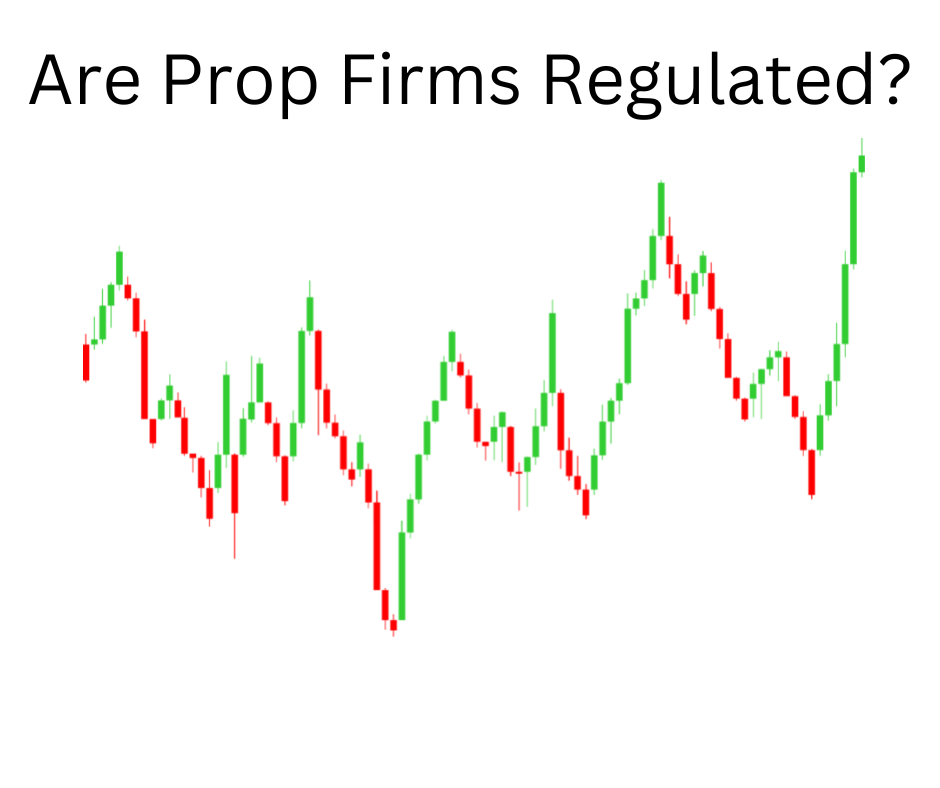As an expert in the financial industry, I have gained extensive knowledge and understanding of prop trading firms and their regulations over the years.
This experience has provided me with valuable insights into the inner workings of these firms and their role in the financial markets.
In the following article, I will discuss various aspects of prop trading firms, including their legality, differences from brokers, and the regulatory landscape in which they operate.

Are prop firms legal?
Yes, prop firms are legal and play a crucial role in the financial markets. Proprietary trading firms, or prop firms, are companies that trade financial instruments using their own capital.
They generate profits for themselves rather than for clients. These firms operate in a highly regulated environment and are subject to various rules and regulations, depending on the jurisdiction in which they’re based.
In the United States, prop trading firms are regulated by the Securities and Exchange Commission (SEC) and the Financial Industry Regulatory Authority (FINRA), among other regulators. These bodies ensure that prop firms comply with relevant laws and maintain the integrity of financial markets.
It’s important to note that these regulations are targeted towards US-based prop firms, and if you decide to trade with a foreign-based prop firm, the regulations may be questionable.
The Prop Trading was a fast-growing prop firm that was shut down by the Australian regulators after less than a year of operation.
Prop firms vs brokers
Prop firms and brokers are two different entities in the financial world. Prop firms focus on trading securities using their own capital, aiming to make a profit for the firm. They usually have a team of skilled traders who execute these trades on behalf of the firm.
On the other hand, brokers act as intermediaries between buyers and sellers in the financial markets. They facilitate trades on behalf of clients and earn a commission for their services. Brokers are not in the business of trading for their own account; their primary goal is to help clients buy and sell securities.
Regulations for prop firms that offer funded accounts
Prop firms that offer funded accounts, also known as remote prop trading firms, provide capital to traders who meet specific criteria. These firms usually require traders to pass a qualification process, such as a trading challenge, before gaining access to the firm’s capital.
These firms are also subject to regulations, depending on the jurisdiction in which they operate. For example, in the United States, they are regulated by the SEC and FINRA. The regulators ensure that these firms comply with rules such as proper risk management, capital adequacy, and reporting requirements.
An Example of a Proprietary Trading Desk
Goldman Sachs, one of the most well-known investment banks, operates a proprietary trading desk. Their traders engage in a wide range of activities, including trading stocks, bonds, commodities, and derivatives. They use advanced strategies, including arbitrage, market-making, and high-frequency trading, to generate profits for the firm.
This trading desk is subject to numerous regulations, as Goldman Sachs is a large and influential financial institution. The regulatory oversight helps ensure the stability of financial markets and protects investors from potential misconduct.
How Does Proprietary Trading Work?
Proprietary trading involves a financial firm trading on its own account, using its own capital to make profits. Proprietary traders are skilled professionals who specialize in various trading strategies, such as arbitrage, market-making, and high-frequency trading.
A proprietary trader makes financial decisions as an employee or representative of a firm
A prop trader is an employee or a representative of a prop trading firm. They’re responsible for making financial decisions and executing trades on behalf of the firm. These traders usually have access to advanced trading tools and resources to help them make informed decisions.
How Prop Trading Differs from Retail Brokers
Prop trading differs from retail brokers in several ways. As mentioned earlier, prop traders trade for the firm’s account, while retail brokers facilitate trades for clients. Additionally, prop traders have access to more sophisticated trading tools and resources and lower trading fees than retail traders.
Prop traders are typically hired by banks and hedge funds or by firms that specialize in proprietary trading
Prop traders are typically hired by banks, hedge funds, or firms that specialize in proprietary trading. These firms look for individuals with a strong background in finance, trading experience, and excellent analytical skills. Prop traders usually work in a fast-paced, high-pressure environment and are expected to make quick, informed decisions to generate profits for the firm.
More: are prop firms legit or scams?
How to choose a proprietary firm to trade with
When choosing a proprietary firm to trade with, consider the following factors:
Reputation and track record: Research the firm’s reputation and performance history in the industry. Look for firms with a solid track record and positive reviews from current and former traders.
Training and mentorship: A good prop firm should provide training and mentorship to help you develop your trading skills. Check if the firm offers a comprehensive training program, one-on-one coaching, or access to experienced traders for guidance.
Trading tools and resources: The firm should offer advanced trading tools, resources, and technology to help you make informed trading decisions. Look for features like sophisticated trading platforms, real-time market data, and research tools.
Capital allocation and risk management: Understand the firm’s capital allocation process and risk management policies. Ensure that the firm provides adequate capital and has strict risk management guidelines to protect both the trader and the firm.
Fees and profit-sharing: Evaluate the firm’s fee structure and profit-sharing arrangement. Some firms charge a monthly desk fee or a percentage of your profits. Make sure you understand the terms and conditions before signing up.
Why Do Firms Engage in Proprietary Trading?
Firms engage in proprietary trading for various reasons, including:
Profit generation: Prop trading can generate significant profits for the firm if executed correctly. Skilled prop traders can take advantage of market inefficiencies and capitalize on opportunities that arise.
Risk diversification: Proprietary trading can help firms diversify their risk by engaging in various trading strategies and financial instruments.
Market-making: Some firms engage in prop trading to provide liquidity to the market. By acting as market-makers, these firms help maintain an orderly and efficient market.
New regulations introduced in 2010 have severely limited the size and scope of many prop trading operations
In 2010, the Dodd-Frank Wall Street Reform and Consumer Protection Act was passed in the United States, introducing a range of new regulations for the financial industry. One of the key provisions of this act, the Volcker Rule, significantly restricted the proprietary trading activities of banks and other financial institutions.
The Volcker Rule aimed to reduce systemic risk and prevent a repeat of the 2008 financial crisis by prohibiting banks from engaging in proprietary trading, with some exceptions. As a result, many banks have scaled back or shut down their prop trading operations, leading to the rise of independent prop trading firms.
Conclusion
Prop trading firms play a significant role in the financial markets and are subject to various rules and regulations, depending on the jurisdiction in which they operate. They differ from brokers in their primary focus, which is trading for their own account to generate profits.
When choosing a prop trading firm to trade with, consider factors such as reputation, training, trading tools, capital allocation, and fees.
Understanding the regulatory environment surrounding prop trading is essential, especially in light of new regulations like the Dodd-Frank Act and the Volcker Rule, which have significantly impacted the industry.
